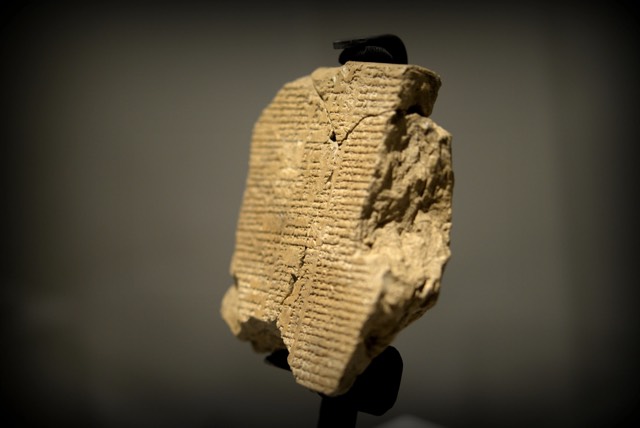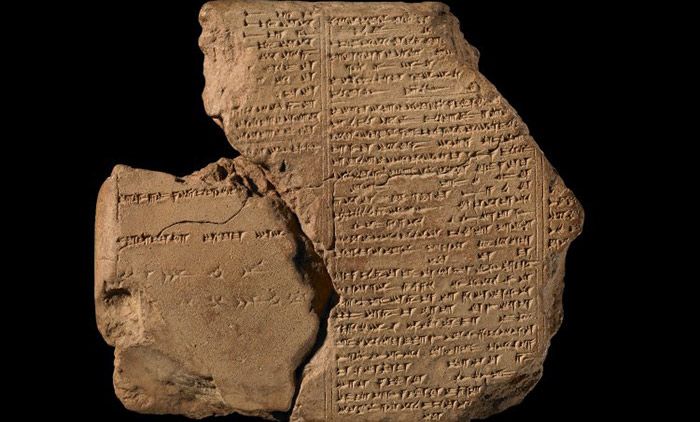

But one man, Utnapishtim, received instructions in a dream from the god Ea, saying to build an enormous boat. Utnapishtim says that Gilgamesh will not find immortality, and he tells Gilgamesh a story: Long ago, in a city called Shurrupak, the god Enlil grew sick of the city’s noisiness and created a flood to destroy mankind.
#Epic of gilgamesh how to
Urshanabi tells Gilgamesh to prepare 120 wooden poles for their journey, and they set off.Īfter crossing the sea, Gilgamesh meets Utnapishtim on an island and asks him how to seek immortal life. Gilgamesh then searches for Urshanabi the ferryman, and in his anger Gilgamesh smashes an essential piece of Urshanabi’s boat. Siduri, whom Gilgamesh meets in the Garden of the Gods, warns Gilgamesh that he will not cross the sea. After crossing a mountain range that no man has ever crossed before, Gilgamesh arrives at the Garden of the Gods. Gilgamesh and the people of Uruk mourn Enkidu as he dies.Īgain Gilgamesh journeys out into the wilderness, now hoping to find the legendary Utnapishtim, who survived a great flood many years before and was granted immortality. The following night, Enkidu has a dream of the gods gathered together and agreeing that one of the two (Enkidu and Gilgamesh) must die for the killing of Humbaba and the Bull of Heaven. The Bull of Heaven wreaks havoc in Uruk, killing many, but Gilgamesh and Enkidu defeat it. Enraged by his refusal, Ishtar threatens to smash the doors of hell and release the dead unless her father, Anu, releases the Bull of Heaven to destroy Gilgamesh.
.jpg)
Gilgamesh turns her down, however, because she treated her previous lovers badly, often turning them into animals. Ishtar, the goddess of love, invites Gilgamesh to her palace and proposes marriage. Humbaba pleads for forgiveness, but Enkidu delivers the killing blow. With the help of Shamash, the sun god, Gilgamesh and Enkidu defeat Humbaba. He pledges to travel to the Land of Cedars and slay the giant Humbaba who guards it. They each commend each other’s strength and declare themselves friends.īecause of a dream he has that Enkidu interprets, Gilgamesh realizes that he has not yet made a name for himself.

They wrestle, but Gilgamesh beats Enkidu. Afterwards, when Enkidu returns to the hills where he lives, the animals run away from him.Įnkidu eventually travels to Uruk and blocks Gilgamesh’s way while walking in the city. The trapper then brings a temple prostitute, Shamhat, to Enkidu, and she seduces him. Both the trapper’s father and Gilgamesh tell him that when Enkidu sleeps with a woman, the animals he lives with will reject him. The trapper describes Enkidu as the strongest man in the world. Enkidu lives in nature, in harmony with the wild animals.Įventually a trapper discovers that Enkidu has been destroying his traps. Aruru forms Enkidu out of water and clay, out in the wilderness. The gods hear these complaints, and the god Aruru creates Enkidu, a man as strong as Gilgamesh. Though Gilgamesh is known to be stronger than any other man, the people of Uruk complain that he abuses his power. Written in cuneiform on 12 clay tablets, this Akkadian version dates from around 1300 to 1000 B.C.The story begins in Uruk, a city in Ancient Sumer (Mesopotamia) where Gilgamesh rules as king. This epic story was discovered in the ruins of the library of Ashurbanipal in Nineveh by Hormuzd Rassam in 1853. “The Epic of Gilgamesh” tells of the Sumerian Gilgamesh, the hero king of Uruk, and his adventures. But generations of several civilizations created the story, added to it, wrote it down, translated it and edited the collection of tales that came to be known as Gilgamesh. Not even any one people can be said to have written it collectively. No one person wrote The Epic of Gilgamesh. Then, does the Epic of Gilgamesh have an author? language Ĭonsequently, who wrote the original Epic of Gilgamesh?īeside above, when was the Epic of Gilgamesh written? 2100 BC

The latest and most complete version yet found, composed no later than around 600 b.c., was signed by a Babylonian author and editor who called himself Sin-Leqi-Unninni. The ancient authors of the stories that compose the poem are anonymous.


 0 kommentar(er)
0 kommentar(er)
